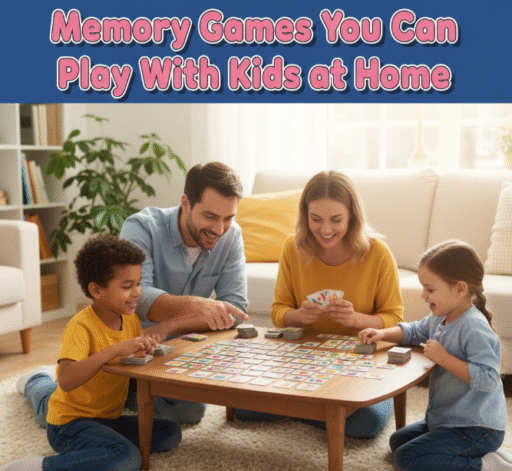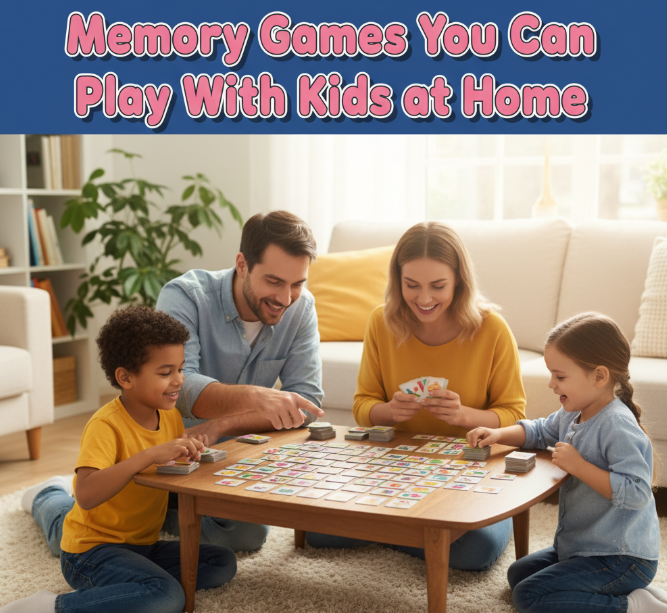Introduction: Why Memory Games Matter
When kids play memory games, they aren’t just having fun—they are strengthening important brain skills that will help them in school and everyday life. Memory games improve focus, attention, problem-solving, and critical thinking, while also building patience and teamwork. The best part? You don’t need expensive toys or gadgets. With a little creativity, you can set up exciting memory games right in your living room, kitchen, or backyard.
In this article, we’ll explore a wide variety of memory games you can play with kids at home, from simple card-based challenges to fun physical activities. You’ll also find step-by-step guides, variations, and tips to keep kids entertained while boosting their cognitive abilities.
Benefits of Playing Memory Games at Home
Before diving into the actual games, let’s look at why memory games are so valuable for children:
-
Improves Concentration – Kids learn to pay attention to small details.
-
Strengthens Short-Term and Long-Term Memory – Helps recall things faster.
-
Boosts Academic Skills – Enhances math, reading, and problem-solving abilities.
-
Encourages Social Interaction – Many memory games require teamwork or friendly competition.
-
Reduces Screen Time – Engages kids in meaningful, offline activities.
👉 According to child development experts, kids who regularly play memory-based games show better academic performance and stronger problem-solving skills than those who don’t.
Classic Card and Board Memory Games
1. The Traditional Memory Card Match
This is the most popular memory game and requires only a deck of cards (or printed picture cards).
How to Play:
-
Lay cards face down in rows.
-
Players take turns flipping two cards.
-
If they match, the player keeps the pair.
-
If not, the cards are turned back over.
-
The player with the most pairs at the end wins.
Tips to Make It Fun:
-
Use themed cards (animals, shapes, colors) for younger kids.
-
Increase difficulty by adding more cards for older kids.
2. Simon Says (Memory Version)
Everyone knows “Simon Says,” but adding a memory twist makes it more challenging.
How to Play:
-
One person (the leader) gives commands like, “Simon says touch your nose.”
-
Instead of acting right away, players must wait and remember 3–4 commands before performing them in order.
-
Anyone who forgets the sequence is out.
This version sharpens working memory and sequencing skills.
3. Remember and Repeat Story Game
This game blends storytelling with memory recall.
How to Play:
-
One player begins with a sentence: “I went to the market and bought an apple.”
-
The next player repeats it and adds something new: “…and a banana.”
-
The chain continues until someone forgets the sequence.
Great for enhancing verbal memory and creativity.
Fun Household Object Memory Games
4. Tray Memory Challenge
Perfect for kids of all ages.
Setup:
-
Place 10–15 household items (toys, spoon, book, etc.) on a tray.
-
Allow kids to look at it for 30 seconds.
-
Cover the tray with a cloth.
How to Play:
-
Kids must write down or say as many items as they remember.
-
Add difficulty by increasing items or reducing viewing time.
5. What’s Missing?
This variation keeps kids active.
Steps:
-
Place 5–10 objects on a table.
-
Let kids observe for a minute.
-
While they close their eyes, remove one object.
-
They must figure out what’s missing.
👉 This simple game strengthens visual memory and observation skills.
6. Color Hunt Challenge
A fun game that connects memory with movement.
How to Play:
-
Tell kids: “Remember three colors: red, blue, and yellow.”
-
They must run around the house and bring objects in those colors in the same order.
-
Increase the number of colors as they improve.
Active Movement-Based Memory Games
7. Dance Step Recall
Kids love dancing, and this game turns it into memory training.
Instructions:
-
Parent or leader creates a dance step (clap + jump).
-
Next player repeats it and adds another step (spin).
-
The chain continues.
This enhances body coordination and sequential memory.
8. Obstacle Course Recall
Combine physical activity with brain power.
How to Play:
-
Create a simple obstacle course with pillows, chairs, or cones.
-
Show kids the sequence (jump → crawl → run → spin).
-
They must remember and complete the course in order.
9. Action Sequence Memory Game
Instead of words, use physical actions.
Example Sequence:
-
Touch head → clap → stomp → turn around.
-
Each player adds one new action, and others must repeat the full sequence.
Word and Number Memory Games
10. Number Chain
A great way to boost math-related memory.
How to Play:
-
One player says a number (e.g., 5).
-
The next player repeats it and adds another number (5, 12).
-
Continue building the chain until someone forgets.
11. Shopping List Game
Helps kids strengthen memory while pretending to shop.
How to Play:
-
Player 1: “I went shopping and bought apples.”
-
Player 2: “I went shopping and bought apples and bread.”
-
Continue until the list is too long to remember.
12. Word Hunt Memory
Boosts vocabulary and recall.
Instructions:
-
Choose a category (animals, food, countries).
-
Each player must say a word in that category and remember all previous words.
-
Example: “Cat → Cat, Dog → Cat, Dog, Lion…”
Creative DIY Memory Games
13. Homemade Picture Card Match
Instead of buying cards, kids can draw their own matching pairs.
Steps:
-
Fold paper into squares.
-
Draw or print simple shapes, animals, or letters.
-
Play the matching game as usual.
14. Memory Jigsaw Challenge
A twist on puzzles.
How to Play:
-
Show kids a completed puzzle for 1 minute.
-
Mix up the pieces.
-
See if they can rebuild it without looking at the picture.

Memory Games You Can Play With Kids at Home
15. Sound Sequence Game
This one is all about listening.
Setup:
-
Use household items to create sounds (clap, tap a spoon, shake a jar).
Play:
-
Make a sound sequence (clap → tap → shake).
-
Kids must repeat the sequence exactly.
Printable and Digital Memory Games
If you prefer structured play, you can use printable worksheets and online apps (but keep screen time balanced).
Examples of Printables:
-
Memory matching grids (pictures or numbers).
-
Mazes with hidden objects.
-
Spot-the-difference challenges.
Examples of Digital Games:
-
Online card-matching apps.
-
Simon Says electronic versions.
-
Educational memory puzzles.
Table: Quick Comparison of Popular Memory Games
| Game Name | Age Group | Skills Improved | Difficulty Level |
|---|---|---|---|
| Memory Card Match | 4+ | Visual recall, focus | Easy–Medium |
| Tray Memory Challenge | 5+ | Observation, memory | Easy |
| Story Chain Game | 6+ | Verbal memory, creativity | Medium |
| Dance Step Recall | 5+ | Coordination, sequence | Medium |
| Shopping List Game | 6+ | Vocabulary, memory | Medium–Hard |
| Obstacle Recall | 7+ | Physical + mental memory | Medium–Hard |
Tips to Keep Memory Games Engaging
-
Rotate Games Frequently – Kids get bored quickly, so introduce new variations.
-
Use Rewards – Small treats or praise motivate kids to try harder.
-
Play in Teams – Encourages cooperation and social bonding.
-
Adjust Difficulty – Start simple, then increase complexity as memory improves.
-
Add Themes – Use holidays, cartoons, or favorite foods as game themes.
How Memory Games Help in School Learning
-
Math: Improves ability to remember numbers, equations, and formulas.
-
Reading: Helps kids retain story sequences and new vocabulary.
-
Science: Encourages recall of processes, cycles, and facts.
-
Everyday Life: Strengthens focus during tasks like following instructions.
Conclusion: Making Memory Fun at Home
Memory games are not only entertaining but also a powerful tool for child development. From simple card matches to exciting obstacle challenges, these games can be played anytime without needing fancy equipment. By adding creativity and variety, parents can transform ordinary playtime into a fun-filled brain workout.
So next time your kids say, “I’m bored,” surprise them with a memory game that keeps them smiling, moving, and learning—all at the same time!




